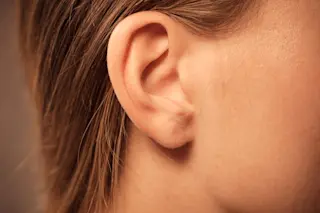Centuries' worth of anecdotal reports suggest that blind people hear better than the sighted, compensating for the sense they have lost. Recently, behavioral neuroscientist Franco Lepore of the University of Montreal conducted some experiments that confirmed that blind people are much better at pinpointing sounds than are sighted subjects. Lepore's team tested the ability of eight totally blind subjects to locate sounds that were piped randomly through 16 loudspeakers placed at ear level in a semicircle around each volunteer.
The brain normally performs this type of sound localization by processing differences between the two ears in both the arrival time of sound and its loudness. (The alteration of sound by the pinna, or outer ear, also plays a role. See "What's a Pinna For?") But surprisingly, when the blind subjects were asked to locate the sound source with one ear blocked, half of them still did so perfectly, even when the sound originated on the side of the blocked ear. Sighted volunteers, on the other hand, had little luck at pinpointing sounds regardless of whether their ears were blocked or not.
Lepore has not yet figured out exactly why his blind subjects have such acute hearing, but he suspects that it has to do with a reorganization of the brain that occurs when vision is absent. Ongoing work by Lepore's lab indicates that sounds trigger activity not just in the hearing centers of the brain but also in the occipital cortex--a region normally reserved for vision. Other research teams have found that when blind people read braille, they activate regions of the brain devoted to touch and vision. In the sighted, reading braille triggers the touch center alone. "These converging studies seem to tell us that the auditory structures in the brains of blind people are expanding into areas normally reserved for vision, which aren't doing anything," Lepore says. "That may be why blind people are better at localizing sound."














